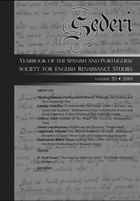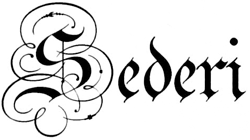
Sederi 20
Sederi 20 — 2010
EDITORS
Berta Cano Echevarría & Ana Sáez-Hidalgo
REVIEW EDITOR
Francisco José Borge López
ISSN 1135-7789
Zenón Luis Martínez, “Macbeth and the passions’ “proper stuff”.” SEDERI 20 (2010): 71-101.
DOI: https://doi.org/10.34136/sederi.2010.4 Download PDF
Abstract
This essay examines early modern conceptions and representations of the passions in relation to issues of self-knowledge in texts ranging from Renaissance psychology to Shakespearean tragedy –with a particular focus on Macbeth. Considered in essence processes of the mind, the passions were believed to manifest themselves through material symptoms such as bodily effects, facial gestures and discourse. Accordingly, the early modern philosophy of man saw in the study of these material manifestations a vehicle to access the soul. By tracing the methodologies for translating the material side of human experience –words, gestures, bodily sensations and signals– into less material truths, early modern philosophy and theatre explored the certainties about inwardness as a necessary dimension of the self, as well as the uncertainties about the ultimate essence of such interiority. In this, Shakespeare’s Macbeth, for its constant focus on outward appearance and rhetoric, stresses the need to focus on matter as a vehicle to explore interiority. And yet –and in keeping with the principles of earlier Renaissance humanists– the play acknowledges the utter impossibility to know the ultimate essence of the inward self.
Keywords: Renaissance tragedy; Shakespeare studies; Macbeth; humanism; rhetoric; (the) passions of the mind.
References
Aers, David 1992. “A Whisper in the Ear of Early Modernists: or, Reflections on Literary Critics Writing the ‘History of the Subject.’” Ed. David Aers. Culture and History 1350-1600: Essays on English Communities, Identities and Writing. London: Harvester: 177-202.
Aristotle 1926. Art of Rhetoric. Ed. and trans. J. H. Freese. Cambridge, Ms.: Harvard University Press.
Bamborough, J. B. 1952. The Little World of Man. London: Longmans, Green, and Co., 1952.
Barker, Francis 1984. The Tremulous Private Body: Essays on Subjection. London: Methuen.
Bartholomeusz, Dennis 1969. Macbeth and the Players. Cambridge: Cambridge University Press.
Baumbach, Sybille 2008. Shakespeare and the Art of Physiognomy. Penrith: Humanities-Ebooks.
Bright, Timothy 1586. A Treatise of Melancholie. London: Thomas Vautrollier.
Camden, Carroll 1941. “The Mind’s Construction in the Face.” Philological Quarterly 20/3: 400-412.
Campbell, Lily B. 1930. Shakespeare’s Tragic Heroes: Slaves of Passion. London: Methuen.
Cefalu, Paul 2004. Revisionist Shakespeare: Transitional Ideologies in Texts and Contexts. New York: Palgrave Macmillan.
Cicero, Marcus Tullius 1577. Four Several Treatises. Trans. Thomas Newton. London.
Cicero, Marcus Tullius 1942. De Oratore. Ed. and trans. H. Rackham. Cambridge, Ms.: Harvard University Press.
Colish, Marcia L. 1962. “The Mime of God: Vives on the Nature of Man.” Journal of the History of Ideas 23/1: 3-20
Craig, Hardin 1927. “A Contribution to the Theory of the Renaissance.” Philological Quarterly 6: 321-333.
Craig, Hardin 1975 (1952). The Enchanted Glass: The Elizabethan Mind in Literature. Westport: Greenwood Press.
Crawford, A. W. 1915. “O proper stuff! – Macbeth, III, iv, 60.” Modern Language Notes 30/5: 158-160.
Davies, John 1599. Nosce Teipsum. London: Richard Field.
Diehl, Huston 1983. “Horrid Image, Sorry Sight, Fatal Vision: The Visual Rhetoric of Macbeth.” Shakespeare Studies 16: 191-204.
Doran, Madeleine 1954. Endeavors of Art: A Study of Form in Elizabethan Drama. Madison: University of Wisconsin Press.
Elam, Keir 1996. “‘In What Chapter of his Bosom?’: Reading Shakespeare’s Bodies.” Ed. Terence Hawkes. Alternative Shakespeares, vol. 2. London: Routledge: 140-163.
Florio, John 1598. A World of Words. London: Arnold Hatfield.
Freud, Sigmund 1977 (1916). “Some Character-Types Met with in Psycho-analytic Work.” Writings on Art and Literature. Stanford: Stanford University Press: 151-175.
Headlam Wells, Robin 2005. Shakespeare’s Humanism. Cambridge: Cambridge University Press.
Hill, Thomas 1571. The Contemplation of Mankind. London.
Holinshed, Raphael 1586. The Second Volume of Chronicles. London.
Jonson, Ben 1966 (1599). Every Man in His Humour. Ed. Martin Seymour-Smith. London: Ernest Benn.
Joseph, B. L. 1951. Elizabethan Acting. London: Oxford University Press
Kerrigan, William 1996. “Macbeth and the History of Ambition.” Ed. John O’Neill. Freud and the Passions. University Park: University of Pennsylvania Press: 13-24.
Kirsch, Arthur 1972. The Passions of Shakespeare’s Tragic Heroes. Charlottesville: University Press of Virginia.
Kocher, Paul H. 1953. Science and Religion in Elizabethan England. San Marino, Ca.: Huntington Library.
Kocher, Paul H. 1954. “Lady Macbeth and the Doctor.” Shakespeare Quarterly 5/4: 341-349.
Machiavelli, Niccolò 1640. The Prince. Trans. Edward Dacres. London.
McDonald, Charles Osborne 1966. The Rhetoric of Tragedy: Form in Stuart Drama. Amherst: The University of Massachusetts Press.
Maus, Katharine Eisaman 1995. Inwardness and Theater in the English Renaissance. Chicago: The University of Chicago Press.
Nonius Marcellus 2003. De compendiosa doctrina. Ed. Wallace M. Lindsay. Munich: Saur.
Paster, Gail Kern 2004. Humouring the Body: Emotions and the Shakespearean Stage. Chicago: The University of Chicago Press.
Paster, Gail Kern, Katherine Rowe, and Mary Floyd Wilson eds. 2004. Reading the Early Modern Passions: Essays in the Cultural History of Emotions. Philadelphia: University of Pennsylvania Press.
Peacham, Henry 1577. The Garden of Eloquence. London.
Quintilian 1921. Institutio Oratoria. Ed. and trans. H. E. Butler. Cambridge, Ms.: Harvard University Press. 3 vols.
Rossky, William 1958. “Imagination in the English Renaissance: Psychology and Poetic.” Studies in the Renaissance 5: 49-73.
San Isidoro de Sevilla 1982 (c. 615). Etimologías [Etymologiarum libri]. Ed. José Oroz Reta and Manuel A. Marcos Casquero. Madrid: Biblioteca de Autores Cristianos.
Schoenfeldt, Michael C. 1999. Bodies and Selves in Early Modern England: Physiology and Inwardness in Spenser, Shakespeare, Herbert, and Milton. Cambridge: Cambridge University Press.
Shakespeare, William 1972 (1601). Hamlet. Ed. Harold Jenkins. London: Methuen.
Shakespeare, William 1997 (1606). Macbeth. Ed. A. R. Braunmuller. Cambridge: Cambridge University Press.
Shakespeare, William 1990 (1606). Macbeth. Ed. Nicholas Brooke. Oxford: Oxford University Press.
Shakespeare, William 1984 (1605). Othello. Ed. Norman Saunders. Cambridge: Cambridge University Press.
Shakespeare, William 1985 (1602). Twelfth Night. Ed. Elizabeth Story Donno. Cambridge: Cambridge University Press.
Sherry, Richard 1550. A Treatise of the Figures of Grammer and Rhetorike. London: Richard Tottel.
Sidney, Philip 1931 (1591). Astrophel and Stella. Ed. Mona Wilson. New York: Nonesuch Press.
Soellner, Rolf 1972. Shakespeare’s Patterns of Self-Knowledge. Columbus: Ohio State University Press.
Taylor, Charles 1989. Sources of the Self: the Making of Modern Identity. Cambridge: Cambridge University Press.
Thomson, Peter 1997. “Rogues and Rhetoricians: Acting Styles in Early English Drama.” Ed. John D. Cox and David S. Kastan. A New History of Early English Drama. New York: Columbia University Press: 321-335.
Vives, Juan Luis 1612 (1531), De disciplinis. Hi de Curruptis Artibus Doctissimi viri notis, illi de tradendis Disciplinis cuiusdam Studiosi Oxoniensis annotationibus illustrati. Cum indice copioso. London.
Vives, Juan Luis 1782. De anima et vita. Opera Omnia, Tomus III. Ed. Gregorio Mayans. Valencia.
Vives, Juan Luis 1913. On Education: a Translation of the De tradendis disciplinis. Trans. Foster Watson. Cambridge: Cambridge University Press.
Whitney, Geffrey 1997 (1586). A Choice of Emblems. Ed. Peter Daly. The English Emblem Tradition. Index Emblematicus. Vol. 1. Toronto: The University of Toronto Press.
Wright, Thomas 1604 (1601). The Passions of the Minde in Generall. London: Valentine Simmes.
